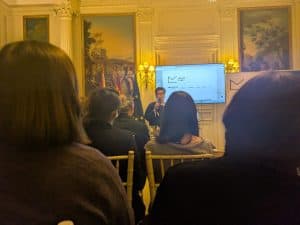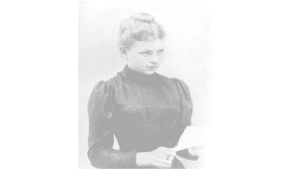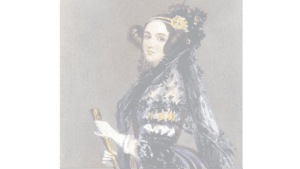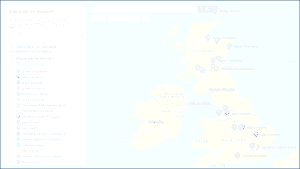As part of the activities commemorating the International Day of Women and Girls in Science, the SRUK London constituency hosted the event Women and Global Challenges: Gender Equality in STEM. We explored the current situation in Spain and the UK, where gender inequality prevents girls to engage in STEM disciplines and young women to remain in academia.
A child entering school has endless answers to the question ‘what do you want to be when you grow up?’ By the end of school, these have narrowed to a set of career aspirations that are consistent with their perception about themselves and how they think other people see them.
If the child is a girl, she is likely to graduate with career aspirations less related to research and STEM subjects than a boy classmate. Although girls outperform boys in the majority of STEM subjects, Dr Jess Wade showed us data on the massive gender biases when students select their subjects for A-levels. For physics, only the 22% of the students pursuing physics are girls. For computing sciences, the 10%. Shares are similar when looking at the proportion of graduate girls in engineering and technology (16% of girl graduates) (Data from WISE). The type of school also influences selection of STEM subjects across girls and boys. In the UK, girls were almost two and a half times more likely to go on to do A-level physics if they came from a girls school rather than a co-ed school. In 2011, 50% of state schools did not send girls on to take A-level physics.
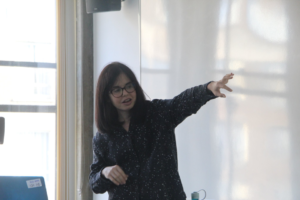
Dr Jess Wade during SRUK/CERU event Women and Global Challenges: Gender Equality in STEM
We know that we are stereotyping children very early. What do we do about it? Since schooling has a strong influence on the career aspirations of students, campaigns to raise awareness of gender bias like WISE are helping to encourage girls in school to go for STEM subjects. Initiatives like Genderaction promote and support a whole-school approach to challenging stereotypes. In Spain, initiatives such as the INSPIRA STEAM and https://11defebrero.org/ are emerging, with over 1300 events last year, many of them in schools. From our very own side, the SRUK Wom=n committee, is bringing Children’s Workshop ‘Awakening Vocations in STEM‘ to 1500 children across 11 schools in 2019, with the aim to break down gender stereotypes and preconceptions while children enjoy Science.
Nowadays, while women represent 53% of undergraduate and master students, they only occupy 28% of researcher positions worldwide (Figure 1). As shown in the figure, the further up you go in the academia ladder, the less women you find. The few that remain tend to have more limited access to funding than men, earn 18% less than their men counterparts and are less represented in prestigious universities and among senior faculty. All these factors together put women at a further disadvantage in high-impact publishing, representation in leadership positions and consequently in decision- and policy-making (UNESCO Science report, towards 2030).
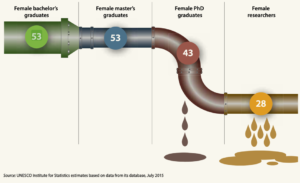
Figure 2. The leaking pipeline. Share of women in higher education and research, 2013 (%). Estimate by the UNESCO Institute for Statistics for 137 countries
In Europe, women represent 20.9% of the top researchers at academic senior positions. In Spain, numbers are nearly identical; women occupy 21% of academic senior positions while the number of senior women researchers in the UK is lower, 17.5%.
Why are there less women in senior positions? There are many reasons contributing to the inequality of academic community, especially in senior posts: uncertain career path, sexual harassment and bullying, impostor syndrome, academic administration, parental leave and caring responsibilities, mental health, unconscious and conscious bias or lack of recognition, among others. Taken together, those factors may explain why it will take 16 years for women and men to publish papers in equal numbers. In physics, it will take 258!
The UK has pioneered many initiatives promoting gender equity at the heart of policy and practice. Funding bodies such as Dorothy Hodgkin Fellowships, Daphne Jackson Trust and Wellcome Trust provide re-entry fellowships after career breaks. In SRUK/CERU, we support a work-family balance by encouraging “family-friendly” events and other measures that facilitate the development of a research career while having family care responsibilities.
But probably the best known initiative is the Athena SWAN Charter, which was established in 2005 to encourage and recognise commitment to advancing the careers of women. Since then, gender culture started to change in many universities, which are now making efforts to report the gender pay gap, to highlight women’s success, or to encourage family-friendly time-tables for meetings. As Dr Pavel Ovseiko´s research study shows, the engagement of universities with the Athena SWAN Charter for Women in Science has had a positive impact in advancing gender equality.
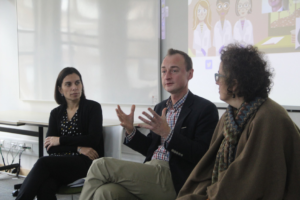
From left to right: Dr María Jiménez, Dr Pavel Ovseiko and Dr Ana Puy during the roundtable of the event Women and Global Challenges: Gender Equality in STEM celebrated in London.
What about ths situation in Spain? Gender Equality plans are starting to be established in universities (The Spanish ERA Roadmap 2016-2020). 73.5% public vs 33.3% private universities have a plan established, 18.4% public vs 28.1% private are now developing them and 87.5% of the public research organizations have gender equality plans to be implemented. However, across the 76 public and private Spanish universities, only eight deans are women…
Progress is being observed during the last years in the share of women studying scientific disciplines as well as the recognition of female scientist at national, regional and global levels, but gaps and barriers persist through the scientific research system. During the last decade, countries such as the UK have injected policy, programming and funding to promote gender equality in research. These initiatives have proven the proper path to encourage women representation in Science and academic careers but there is still a long way to get real equality.
Although valuable, initiatives have not produced as much progress as expected and it is not simply a matter of waiting for female graduates to make their way through the system. All the stakeholders -from students to senior researchers, as well as organizations, universities, companies and policy makers- need to lead the way on gender equality for all genders in the workplace.
Information about the SRUK Wom=n Committee:
Trying to understand and face the challenges for gender equality is the aim of SRUK Wom=n Committee. We examine researchers’ experiences, expectations and perceptions of gender equality to give visibility to the work of women in science and disseminating the relevance of the research they carry out. We also offer SRUK Professional Career Development Webinars to encourage the professional development of women throughout their research career through mentoring, capacity building, leadership, self-esteem, etc.
Post by Judit García González. PhD student, Queen Mary, University of London. Member of the SRUK/CERU Wom=n Equity & Research Committee

